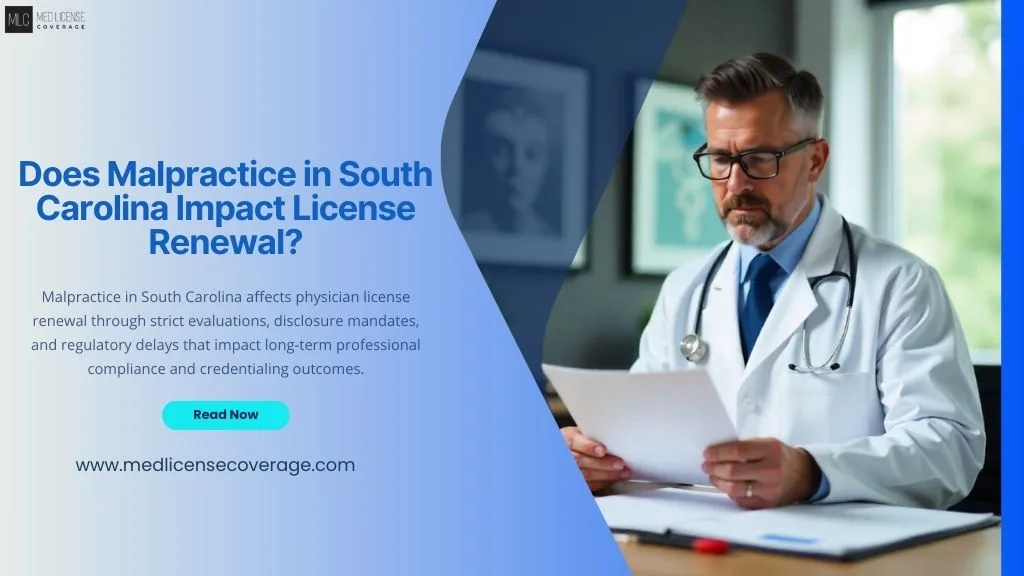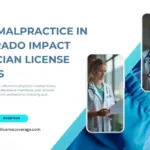Introduction
Malpractice in South Carolina influences the license renewal process for physicians. Regulatory boards oversee each case with attention to risk, documentation, and conduct. Renewal may be delayed or denied based on findings.

1. Understanding Malpractice in South Carolina
Malpractice in South Carolina refers to negligence or misconduct by a licensed physician. State boards examine claims with scrutiny. A verified case may lead to professional review and administrative action.
2. State Oversight on License Renewal
The South Carolina Board of Medical Examiners regulates licensing. Renewal involves evaluation of past conduct, including malpractice. Risk assessment and disciplinary history are critical to renewal decisions.
3. Disclosures Required for Renewal
All malpractice cases must be disclosed during renewal. This includes pending cases, settlements, and judgments. Nondisclosure leads to penalties or denial. Full transparency supports regulatory trust.
4. The Role of Verified Claims
Verified malpractice claims are added to the physician’s record. These records are reviewed each time a renewal application is submitted. Repeated claims impact long-term eligibility.
5. Disciplinary Actions and Consequences
Disciplinary measures vary based on severity. Common actions include fines, probation, and suspension. Severe outcomes hinder medical license renewal. Renewal is only granted when risk is minimized.
6. Impact of Active Investigations
Ongoing malpractice investigations delay the renewal process. Boards wait for final resolutions before approving applications. Incomplete case files result in pending status or application denial.
7. Malpractice Reporting and Public Databases
Malpractice in South Carolina is reported to public databases. These records are accessible to hospitals, employers, and patients. Public visibility raises the importance of clean documentation for renewal.
8. Board Hearings for Renewal Challenges
When malpractice is present, the board may conduct hearings. These sessions allow for evidence presentation and clarification. Physicians must meet standards before the renewal is approved.
9. Influence of Specialty-Based Risk
Specialists in surgery, anesthesia, or emergency care face higher scrutiny. High-risk specialties experience delays due to the nature of malpractice claims. Licensing boards review these cases with care.
10. Hospital Privileges and License Renewal
Loss of hospital privileges due to malpractice affects renewal. Boards consider privileged status during evaluation. Renewal may be denied if hospital access is revoked or suspended.
11. Physician License Reinstatement Service Support
These services assist with applications affected by malpractice. Experts manage documentation, timelines, and appeals. Structured support increases approval chances after incidents of malpractice in South Carolina.
12. The Role of Accurate Documentation
Accurate records protect against allegations. Incomplete or inconsistent files lead to liability. Clean records are required for uninterrupted license renewal.
13. Corrective Action Requirements
To proceed with renewal, corrective actions are mandated. These include ethics courses, peer reviews, or monitored practice. Documentation of improvements is necessary for a positive outcome.
14. CME and Post-Malpractice Compliance
Continuing Medical Education (CME) is often required after malpractice. Boards mandate completion before license renewal. CME reflects a commitment to clinical competence and responsibility.
15. Public Complaints and Patient Feedback
Patient complaints filed in relation to malpractice are reviewed. Even informal complaints hold weight. Negative trends impact medical license renewal decisions.
16. Role of Employer Reporting
Employers in South Carolina report malpractice findings to licensing boards. Delayed reports or missing details result in compliance issues. Full employer participation is required for renewal processing.
17. Delays from Incomplete Renewal Forms
Malpractice-related renewals require additional forms. Missing or incomplete fields cause delays. Submitting updated and accurate records reduces hold-ups during board assessment.
18. Multi-State Licensing and Disclosure
Malpractice in South Carolina must be reported when applying in other states. Failure to disclose across state lines causes rejection or license suspension. Full consistency is required.
19. Legal Representation in Malpractice Defense
Attorneys help physicians respond to allegations and board reviews. Legal documents must be accurate and timely. Licensing boards value compliance and legal clarity in renewal decisions.
20. Reinstating a Suspended License
Suspended licenses can be reinstated through a structured process. This includes remediation, supervised practice, and board evaluation. The Physician License Reinstatement Service aids this process.
21. Ethics and Behavioral Reform
Ethical conduct is central to renewal decisions. Physicians must demonstrate change in behavior after malpractice. Boards assess long-term patterns and reform efforts before approving renewal.
22. Hospital Credentialing After Malpractice
Hospitals assess malpractice records during credentialing. Rejected credentials affect licensing status. Renewal is closely tied to hospital and peer review outcomes.
23. Improving Approval After Malpractice
Success involves:
- Full disclosure
- Updated training
- Risk reduction strategies
- Peer endorsements
- Legal and credentialing support
Each element helps rebuild trust with the board.
24. Long-Term Effects on Licensing Records
Malpractice in South Carolina becomes part of permanent history. This affects future job offers, credentialing, and state applications. Managing records properly ensures professional credibility over time.
Conclusion
Malpractice in South Carolina significantly affects license renewal. Each case is evaluated by state boards based on disclosure, documentation, and risk. Delays, denials, or suspensions are common without proper resolution.
Medical license renewal depends on ethical behavior, full transparency, and compliance. Physician License Reinstatement Service improves outcomes by handling complex renewal steps. A complete approach ensures continued practice and regulatory approval.
FAQs
1. Does malpractice in South Carolina delay license renewal?
Yes. Malpractice investigations or settlements delay license renewal. The board must complete risk evaluations and review final outcomes before approving any medical license renewal applications or reinstatement efforts.
2. Are malpractice settlements reported during license renewal in South Carolina?
Yes. All settlements, including those without admission of fault, must be disclosed during license renewal. Nondisclosure leads to penalties or possible medical license renewal denial under South Carolina regulations.
3. Can a license be reinstated after malpractice in South Carolina?
Yes. Using a Physician License Reinstatement Service, reinstatement is possible after completing remediation, ethics training, and meeting board compliance standards outlined by South Carolina’s medical licensing authority.
4. How does malpractice affect high-risk specialists in South Carolina?
High-risk specialists like surgeons or anesthesiologists undergo stricter evaluations. Boards assess malpractice frequency and patient impact before renewing licenses, especially for specialties with repeated malpractice concerns.
5. What documentation is reviewed during license renewal after malpractice?
Licensing boards review malpractice records, settlement details, corrective actions, employer reports, and CME certifications. Accurate documentation supports medical license renewal despite a history of malpractice incidents in South Carolina.6. How do physician services help with malpractice-related license renewal?
Physician License Reinstatement Services manage appeals, organize records, and meet compliance rules. These services reduce renewal delays caused by malpractice and improve approval chances through structured support in South Carolina.







